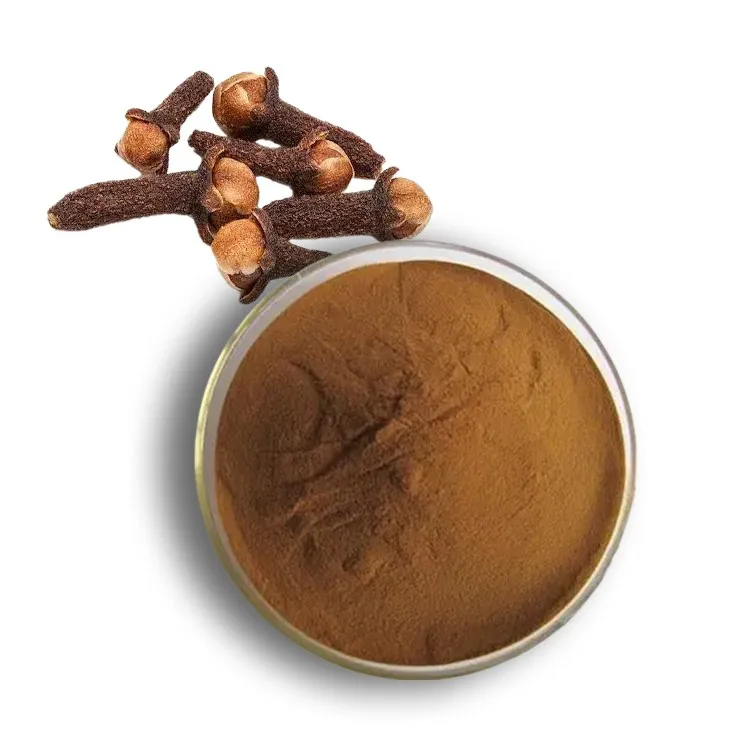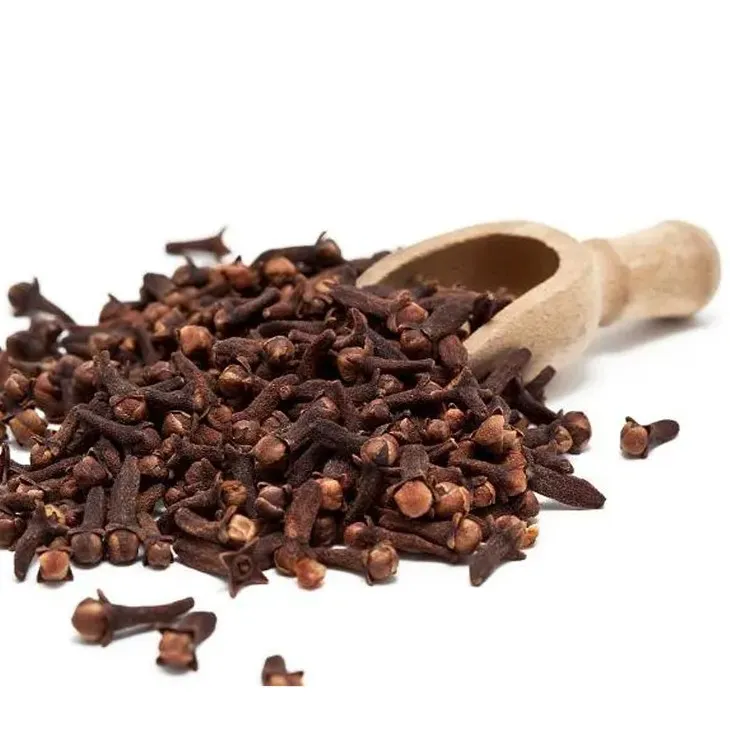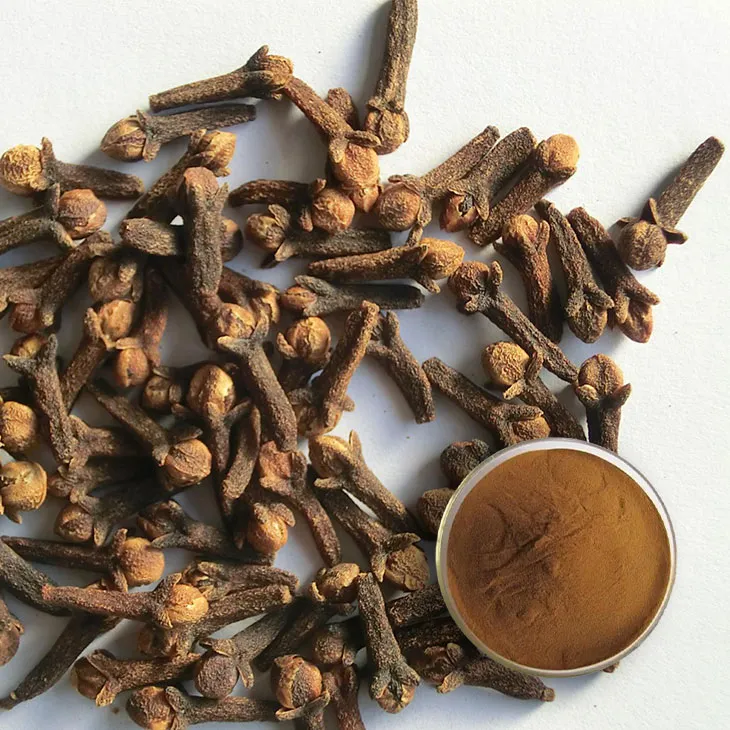- 0086-571-85302990
- sales@greenskybio.com
Standard - process clove powder.
2024-12-01

1. Introduction to Clove Powder
Clove Powder is a remarkable product that has been an integral part of various aspects of human life for centuries. Derived from cloves, it is a fine powder that holds within it a wealth of properties. Cloves, the source of this powder, are the dried flower buds of the clove tree, scientifically known as Syzygium aromaticum. These small, dark - brown buds are native to the Maluku Islands in Indonesia but are now cultivated in many tropical regions around the world.

2. The Process of Creating Standard - Processed Clove Powder
2.1 Harvesting
The first step in creating standard - processed clove powder is harvesting. Cloves are typically harvested when the flower buds are still in their immature stage. This is a crucial time as it determines the quality of the final product. Skilled harvesters carefully pick the buds from the trees to ensure that they are not damaged. Harvesting at the right time helps to preserve the essential oils and other beneficial compounds present in the cloves.
2.2 Drying
After harvesting, the cloves need to be dried. Drying is an important process as it helps to reduce the moisture content in the cloves, which in turn prevents the growth of mold and other microorganisms. There are different methods of drying, including sun - drying and mechanical drying. Sun - drying is a traditional method where the cloves are spread out in the sun on clean trays or mats. However, mechanical drying is also becoming popular as it can be more controlled. The drying process should be carried out at the right temperature and humidity levels to ensure that the cloves retain their quality. Once dried, the cloves should have a moisture content of around 10 - 12%.
2.3 Grinding
The dried cloves are then ground into a fine powder. This is usually done using specialized grinding equipment. The grinding process should be carried out in a clean and hygienic environment to prevent contamination. The fineness of the powder can be adjusted according to the requirements. A finer powder is often preferred for culinary and some medicinal applications as it mixes more easily. During grinding, care should be taken not to overheat the cloves as this can cause the loss of some of the volatile essential oils.

3. Quality Control in Standard - Processed Clove Powder
3.1 Physical Characteristics
The physical characteristics of the clove powder play an important role in determining its quality. The powder should have a uniform color, which is typically a light to dark brown. Any discoloration or presence of foreign particles can indicate poor quality. The texture should be fine and free - flowing. A lumpy or coarse powder may not be suitable for certain applications. Particle size analysis can be carried out to ensure that the powder meets the required specifications.
3.2 Chemical Composition
The chemical composition of clove powder is crucial for its functionality. Essential oils are one of the main components of clove powder. Eugenol is the major component of the essential oil in cloves and is responsible for its characteristic aroma and many of its potential benefits. Quality control measures should ensure that the eugenol content is within the acceptable range. Other chemical components such as flavonoids and tannins also contribute to the overall properties of the clove powder. Chemical analysis techniques such as gas chromatography - mass spectrometry (GC - MS) can be used to accurately determine the chemical composition of the powder.
3.3 Microbiological Quality
Microbiological quality is another important aspect of standard - processed clove powder. Since the powder is used in food and some medicinal applications, it should be free from harmful microorganisms such as bacteria, yeasts, and molds. Microbiological testing should be carried out regularly to ensure that the powder meets the safety standards. Good manufacturing practices (GMP) should be followed during the processing of the clove powder to prevent microbiological contamination.

4. Culinary Applications of Clove Powder
4.1 Baking
Clove powder is a popular ingredient in baking. It adds a warm, spicy flavor to baked goods such as cakes, cookies, and bread. In cakes, for example, a small amount of clove powder can enhance the overall flavor profile, giving it a unique and inviting taste. It pairs well with other spices such as cinnamon and nutmeg, creating a harmonious blend of flavors. Bakers often use clove powder in traditional holiday recipes like gingerbread cookies or fruitcakes, where its rich, spicy aroma is highly desired.
4.2 Meat Dishes
When it comes to meat dishes, clove powder can work wonders. It is often used in marinades for meats such as beef, pork, and lamb. The powder helps to tenderize the meat while also adding a depth of flavor. In slow - cooked meat dishes like stews or braises, clove powder can infuse the meat with its distinctive flavor over time. It can also be used in spice rubs for barbecued meats, creating a delicious crust on the outside while imparting a spicy flavor to the inside.
4.3 Spiced Beverages
Clove powder is a key ingredient in many spiced beverages. In mulled wine, for instance, it combines with other spices like cinnamon, star anise, and orange peel to create a warm, fragrant drink that is perfect for cold winter evenings. It can also be used in spiced teas, adding a spicy kick to the brew. In some cultures, clove - flavored coffee is also popular, where the powder is added to the coffee grounds before brewing to give the coffee a unique and exotic flavor.
5. Medicinal and Therapeutic Uses of Clove Powder
5.1 Relieving Toothache
One of the well - known medicinal uses of clove powder is in relieving toothache. The eugenol present in clove powder has analgesic (pain - relieving) and antibacterial properties. When applied to a painful tooth or gum, it can numb the area and reduce inflammation. Clove oil, which can be obtained from clove powder, has been used for centuries in traditional dentistry for this purpose. However, it should be used with caution as excessive use can cause irritation.
5.2 Improving Digestion
Clove powder may also play a role in improving digestion. It can stimulate the secretion of digestive enzymes, which helps in the breakdown of food in the stomach. It also has carminative properties, which means it can help to relieve gas and bloating. Consuming a small amount of clove powder, either in food or as a supplement, may be beneficial for those with digestive problems. However, more research is needed to fully understand its mechanisms of action in digestion.
5.3 Antioxidant and Anti - Inflammatory Properties
The flavonoids and other compounds in clove powder possess antioxidant and anti - inflammatory properties. Antioxidants help to protect the body's cells from damage caused by free radicals, which are unstable molecules that can cause oxidative stress. Anti - inflammatory properties can be beneficial in reducing inflammation in the body, which is associated with many chronic diseases. While these properties make clove powder a potentially valuable natural remedy, it should not be considered a substitute for medical treatment in serious health conditions.
6. Commercial Significance of Standard - Processed Clove Powder
6.1 Quality Consistency for Manufacturers
For manufacturers, standard - processed clove powder offers the advantage of quality consistency. This is crucial in the food and beverage industry, where consumers expect a consistent taste and quality in their products. By following standard processing procedures, manufacturers can ensure that each batch of clove powder has the same physical, chemical, and microbiological characteristics. This allows them to produce reliable and high - quality products, whether it is a spice blend, a baked good, or a beverage.
6.2 Meeting Consumer Demands
Consumers today are more conscious about the quality and origin of the products they consume. Standard - processed clove powder that meets strict quality standards is more likely to meet consumer demands. Consumers are looking for products that are safe, of high quality, and have a consistent flavor. In addition, with the growing popularity of natural and organic products, there is an increasing demand for clove powder that is processed without the use of harmful chemicals or additives.
6.3 International Trade
On the international trade front, standard - processed clove powder plays an important role. Countries that produce cloves, such as Indonesia, Madagascar, and Tanzania, export significant amounts of clove powder. Having a standard - processed product helps in meeting the import requirements of different countries. It also enhances the competitiveness of the product in the global market. Standardized quality ensures that the product can be easily traded across borders and can reach a wider range of consumers around the world.
7. Storage and Shelf - Life of Clove Powder
7.1 Storage Conditions
Clove powder should be stored in a cool, dry place away from direct sunlight. Exposure to heat, moisture, and light can cause the powder to deteriorate. It is best stored in an airtight container to prevent the absorption of moisture from the air and the loss of essential oils. A pantry or a cupboard in a cool part of the kitchen is a suitable storage location for clove powder.
7.2 Shelf - Life
When stored under the proper conditions, clove powder can have a relatively long shelf - life. Typically, it can last for about one to two years. However, over time, the flavor and potency of the powder may gradually decline. It is advisable to check the powder regularly for any signs of spoilage, such as a change in color, odor, or texture. If any such signs are present, it is best to discard the powder and replace it with a fresh batch.
8. Conclusion
Standard - processed clove powder is a multi - faceted product with a wide range of applications in the culinary, medicinal, and commercial fields. The careful processing of cloves to create a high - quality powder is essential to preserve its unique properties. From its distinct aroma and flavor in cooking to its potential health benefits and its importance in international trade, clove powder continues to be a valuable product. With proper quality control, storage, and handling, it can provide consistent benefits to manufacturers, consumers, and those seeking natural remedies.
FAQ:
What are the main steps in the standard processing of clove powder?
The main steps typically include careful selection of high - quality cloves, drying them to an appropriate moisture level, and then grinding them into a fine powder. This may also involve steps to ensure the preservation of the essential oils, such as gentle handling and proper storage conditions during the process.
How does the essential oil in clove powder contribute to its use in the culinary field?
The essential oil in clove powder gives it a distinct and strong aroma. In baking, it adds a rich, warm flavor to cakes, cookies, and bread. In meat dishes, it can enhance the flavor and act as a natural preservative. For spiced beverages, it imparts a unique and spicy taste, making the drink more flavorful and aromatic.
Why is consistency in quality important for processed clove powder from a commercial perspective?
For manufacturers, consistent quality means they can produce products with reliable flavor and properties, which is essential for building a good brand reputation. Consumers, on the other hand, can expect the same quality every time they purchase the product. This consistency also helps in meeting regulatory requirements and in standardizing recipes in the food and beverage industry.
What evidence is there for the potential health benefits of clove powder in natural remedies?
Some studies have shown that the compounds in clove powder, such as eugenol, may have anti - inflammatory and analgesic properties, which could potentially help relieve toothache. There is also some evidence suggesting that it may aid digestion by promoting the secretion of digestive enzymes. However, more research is still needed to fully understand and confirm these potential health benefits.
How should processed clove powder be stored to maintain its quality?
Processed clove powder should be stored in a cool, dry place, away from direct sunlight. It is best stored in an airtight container to prevent moisture absorption and oxidation, which can cause the essential oils to degrade and the powder to lose its flavor and potency.
Related literature
- The Chemistry and Bioactivity of Clove (Syzygium aromaticum)"
- "Processing and Quality Control of Spice Powders: A Focus on Clove Powder"
- "Culinary and Medicinal Uses of Clove: An Overview"
- ▶ Hesperidin
- ▶ citrus bioflavonoids
- ▶ plant extract
- ▶ lycopene
- ▶ Diosmin
- ▶ Grape seed extract
- ▶ Sea buckthorn Juice Powder
- ▶ Beetroot powder
- ▶ Hops Extract
- ▶ Artichoke Extract
- ▶ Reishi mushroom extract
- ▶ Astaxanthin
- ▶ Green Tea Extract
- ▶ Curcumin Extract
- ▶ Horse Chestnut Extract
- ▶ Other Problems
- ▶ Boswellia Serrata Extract
- ▶ Resveratrol Extract
- ▶ Marigold Extract
- ▶ Grape Leaf Extract
- ▶ blog3
- ▶ blog4
-
The best lemon juice powder in nature.
2024-12-01
-
Organic Vitamin K2 Powder Suppliers
2024-12-01
-
Bulk purchase of L - tyrosine.
2024-12-01
-
Vitamin K2 Manufacturers
2024-12-01
-
100% Pure Natural Rutin.
2024-12-01
-
Chinese Citrus Bioflavonoid Suppliers.
2024-12-01
-
Saw Palmetto Extract
2024-12-01
-
Hedyotis Diffusa Extract
2024-12-01
-
Coix Seed Extract
2024-12-01
-
Rose Hip Extract
2024-12-01
-
Diosmin
2024-12-01
-
melatonin extract
2024-12-01
-
Andrographis Paniculata Extract Powder
2024-12-01
-
Sophora Flavescens Root Extract
2024-12-01
-
Oyster Mushroom Extract Powder
2024-12-01
-
Propolis Extract Powder
2024-12-01





















